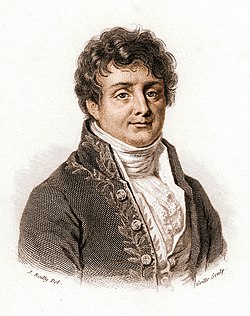Jean-Baptiste Joseph Fourier
| Joseph Fourier | |
|---|---|

Jean-Baptiste Joseph Fourier
|
|
| Born |
21 March 1768 Auxerre, Burgundy, Kingdom of France (now in Yonne, France) |
| Died | 16 May 1830 (aged 62) Paris, Kingdom of France |
| Residence | France |
| Nationality | French |
| Fields | Mathematician, physicist, historian |
| Institutions |
École Normale École Polytechnique |
| Alma mater | École Normale |
| Academic advisors | Joseph-Louis Lagrange |
| Notable students |
Peter Gustav Lejeune Dirichlet Claude-Louis Navier Giovanni Plana |
| Known for |
Fourier series Fourier transform Fourier's law of conduction Fourier–Motzkin elimination |
Jean-Baptiste Joseph Fourier - (/ˈfʊəriˌeɪ, -iər/;French: [fuʁje]; 21 March 1768 – 16 May 1830) was a French mathematician and physicist born in Auxerre and best known for initiating the investigation of Fourier series and their applications to problems of heat transfer and vibrations. The Fourier transform and Fourier's law are also named in his honour. Fourier is also generally credited with the discovery of the greenhouse effect.
Fourier was born at Auxerre (now in the Yonne département of France), the son of a tailor. He was orphaned at age nine. Fourier was recommended to the Bishop of Auxerre, and through this introduction, he was educated by the Benedictine Order of the Convent of St. Mark. The commissions in the scientific corps of the army were reserved for those of good birth, and being thus ineligible, he accepted a military lectureship on mathematics. He took a prominent part in his own district in promoting the French Revolution, serving on the local Revolutionary Committee. He was imprisoned briefly during the Terror but in 1795 was appointed to the École Normale, and subsequently succeeded Joseph-Louis Lagrange at the École Polytechnique.
...
Wikipedia
